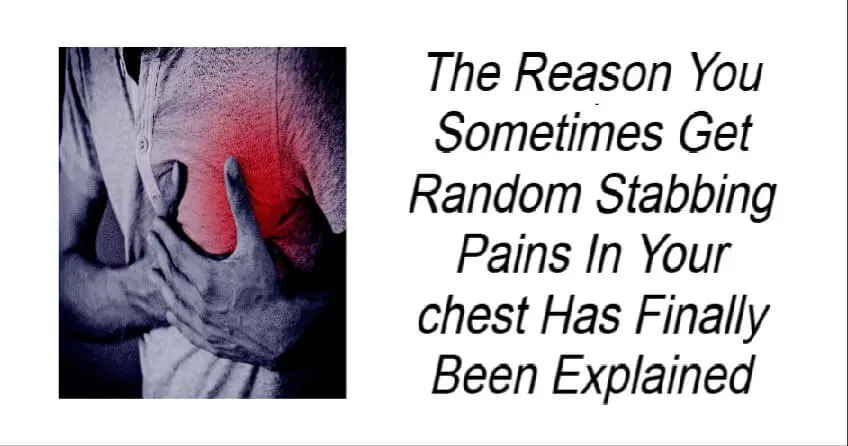
The Reason You Sometimes Get Random Stabbing Pains In Your chest Has Finally Been Explained
Sudden, stabbing chest pain can be terrifying—but in many cases, it’s not a sign of a heart attack or any serious condition. For younger individuals, one of the most common (and harmless) causes is a condition called Precordial Catch Syndrome (PCS). Still, it’s essential to understand your symptoms and know when to seek help.
What Is Precordial Catch Syndrome (PCS)?
Precordial Catch Syndrome is a non-serious condition marked by a sudden, intense stabbing pain in the chest—usually felt just below the left nipple. Despite how sharp or sudden the sensation is, PCS is not related to the heart and has no lasting health consequences.
Who Does It Affect?
-Most common in children, teenagers, and occasionally young adults
-Often linked to growth spurts or poor posture
-May also appear during periods of stress or anxiety
PCS Symptoms
- Sharp, localized chest pain (often described as a pinprick or knife-like)
- Typically occurs when sitting or at rest
- Pain worsens with deep breaths
- No pain radiating to the arm, jaw, or back
- No other symptoms like nausea, sweating, or dizziness
- Usually lasts a few seconds to a few minutes
What Causes PCS?
While the exact cause isn’t fully understood, PCS is believed to result from:
- A pinched or irritated nerve in the chest wall
- Poor posture, slouching, or prolonged sitting, which can compress chest nerves
- Emotional stress or anxiety, which can trigger sensitivity in the nerves
How Is PCS Treated?
- No medical treatment is required
- Pain often disappears on its own
- Sitting or standing upright may help relieve pressure
- Gentle, shallow breaths can reduce discomfort during an episode
Other Common Causes of Sharp Chest Pain
While PCS is harmless, there are other possible causes worth considering:
🔹 Muscle Strain
- Caused by exercise, awkward sleeping positions, or lifting
- Pain worsens with movement or when pressing the sore spot
- Typically muscular, not internal
🔹 Costochondritis
- Inflammation of the cartilage connecting the ribs to the breastbone
- Sharp, tender pain that worsens with deep breathing or pressure on the chest
🔹 Gas or Acid Reflux (GERD)
- Digestive discomfort can mimic chest pain
- Accompanied by bloating, burping, or a burning sensation
🔹 Anxiety or Panic Attacks
- Can cause tightness or sharp pain in the chest
- Often comes with rapid heartbeat, dizziness, sweating, or a feeling of impending doom
When to See a Doctor
While most cases of sharp chest pain aren’t serious, you should seek immediate medical attention if you experience:
- Pain lasting longer than 10 minutes
- Pain that spreads to your jaw, arms, neck, or back
- Shortness of breath
- Nausea, dizziness, or heavy sweating
- A personal or family history of heart disease
Precordial Catch Syndrome is more annoying than alarming—and it’s especially common among young people. However, you should always listen to your body. When in doubt, check it out. Quick action could save you from worry—or in rare cases, something more serious.